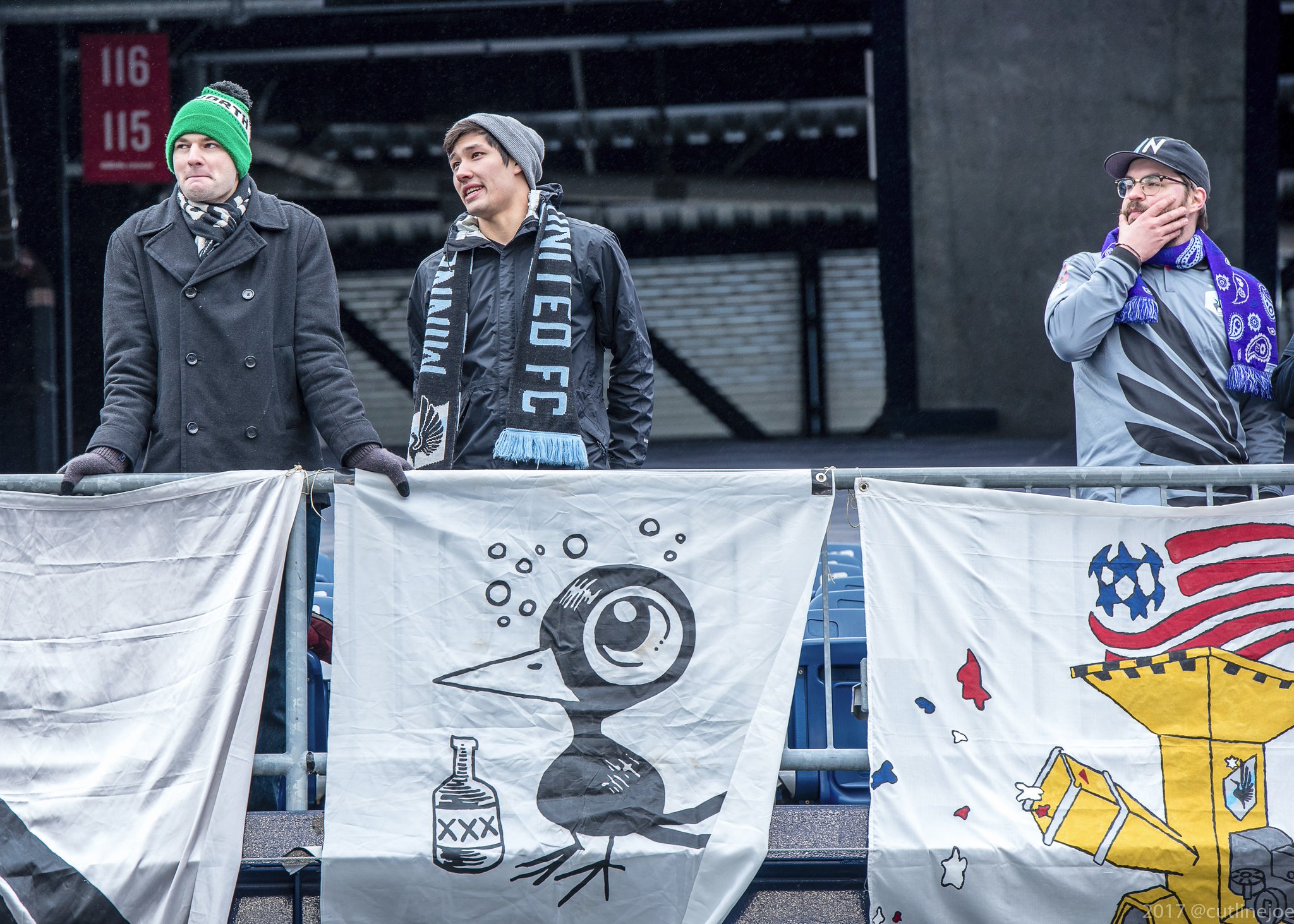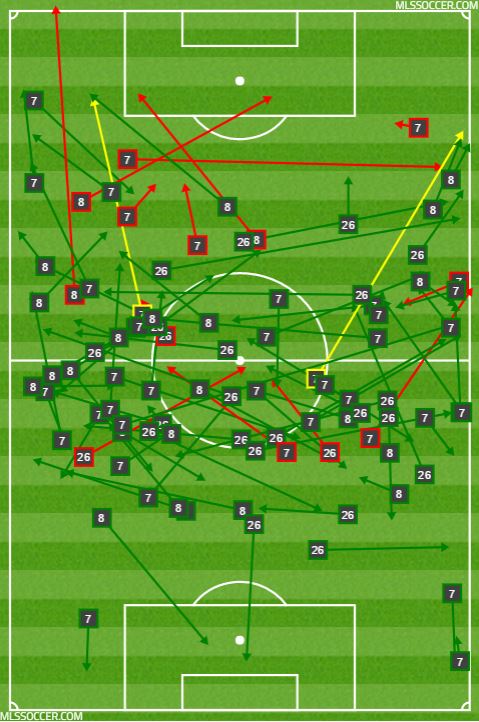Alternate Headline: When Bad Things Happen to Good People
Minnesota United FC has earned all the wrong superlatives after yet another shellacking, its third in four games, this time at the hands of lowly New England. The Loons’ attack remains respectable, but it’s the defense where things have repeatedly fallen apart.
It’s pointless to rehash the abject horror we all witnessed on Saturday afternoon, except to add that I had the privilege this week of seeing it in person. TV plays funny tricks on the viewer. Distances look longer and the play seems faster. In live action, every opposing attack looks closer to your own goal and every cut or pass seems to move slower. None of these tweaks of perspective flattered the visitors on that cloudy afternoon.
The Loons who line up against Real Salt Lake next week will be a much different side than those who played this past weekend. If the team deploys the same tactics and personnel that it did in Colorado, it has a good chance to get a result. But in the long term, a few things have become abundantly clear. Here are three of them:
Vadim Demidov is not up to the job
First, there’s no easy way to say this, so let’s say it simply and straight: Vadim Demidov is a liability in every respect. In the three games he played, Minnesota conceded 16 goals. Demidov has himself given up two penalty kicks, but that doesn’t even tell the whole story. Look at these maps of goals scored against the Loons:
From left to right, Portland, Atlanta, New England
All but four of these goals were scored from left of the penalty spot (i.e., on the right side of the defense) and those that weren’t were scored pretty close to center. All but one of those goals was scored from inside the box. Not all of these goals are Demidov’s fault, but the pattern is unmistakable. Other teams have scored repeatedly from the exact same ground a right center back must occupy. On Saturday, New England knew this and the Revolution attackers targeted the space between Kevin Venegas and Demidov on every single attack.
It is true that Demidov has often been let down by his fullback pairing. He has played with an out-of-position Jermaine Taylor, a just-off-the-plane Jérôme Thiesson, and Kevin Venegas, whose defense has never been his strongest attribute (and having Bashkim Kadrii ahead of both was suicide, that’s obvious now). All the same, Demidov’s poor positioning, slow feet, and aerial weakness have been exposed repeatedly. It can’t continue. When healthy, Brent Kallman and Francisco Calvo must start as center backs. When healthy, Joe Greenspan must be the backup. If two of those three are again unavailable, United must play the 5-3-2 that they reverted to in the second half against the Revolution and pray that the improvement seen in the second half was due to tactics and not just the hosts taking their foot off the gas. And, above all, the team must sign an additional reserve-quality-or-better center back as soon as possible. Kevin Ellis of Sporting Kansas City is a good example of the type of player the Loons could target.
I really am bummed to be writing this. Of all the players the Loons brought in from abroad, I figured Demidov was the least likely to go bust. With his experience in top leagues in Europe and a recent run of success in Norway, I was genuinely excited about the prospective Demidov-Calvo pairing. No doubt the front office thought the same. Demidov was recruited to be an anchor and a veteran presence. I’m sure the team has him signed for multiple years, but sunk costs are sunk. The Loons must either find out if Demidov can play in a new position (perhaps as an ultra-conservative defensive midfielder, though there’s no evidence he’d be better in that role), try to ship him out (unlikely), or see if he’s interested in making a transition to being a player-coach. By all accounts, he is a nice person, a hard worker, and a good leader. Those are attributes that could still be useful to the Loons, but on the field his welcome is worn out.
The defensive failings are really team-wide
While Demidov has been the easy target, one key reason why he has repeatedly been forced into bad decisions has been the inept defensive midfield play in front of him. In particular, Collen Warner, whom we profiled this past week and who also scored for Minnesota, had a horrible game. He lost his man on the opening goal (perhaps trying to cover for Demidov, who briefly seemed to have lost his man) and was a made a fool of by Diego Fagúndez to concede the Loons’ second penalty (though the foul very obviously occurred outside the box). As bad as those two errors were, there’s nothing that will frustrate fans more than an obvious lack of effort. Warner’s nonchalant attitude towards an early Revs breakaway and a driving runner into the box later is simply not acceptable.
Demidov and Warner are two of the three players who have started in each of the Loons’ blowout losses. Mohammed Saeid is the other. In the last game, Saeid’s errors were less egregious, but still costly. He lost a runner on the Revs’ second and was, in hindsight, too late to step up to Juan Agudelo on the Revs’ fourth. Primary blame here belongs to Kevin Venegas, Bobby Shuttleworth, and Jérôme Thiesson, but there’s hardly a single Loon who comes out looking good on this play.
Individual mistakes aside, it was the performance of Warner, Saeid, and Ibson as a unit that was so brutally ineffective on Saturday (Kadrii was also not helpful). The Revs passed between the lines with absurd ease and repeatedly broke in behind the Loons’ midfield to run at MNUFC’s center backs. This has been a theme all season: the Loons’ defense has repeatedly been backpedaling as opposing attackers run at them. The pressure on the ball (e.g., Saeid, Kadrii) — a key way to prevent these types of penetrating passes — was non-existent. Now, instead of pressure, teams can opt for compactness in the center of the box, but that was also missing. To make matters worse, that same midfield struggled mightily to hold onto the ball against a high pressing Revolution team and to distribute it to attacking players. These dual failings compounded themselves as the Loons’ midfield and defense came under pressure more often and wilted quickly when under that pressure. A similar story can be told for most of Minnesota’s matches.
What’s the issue here? It’s hard to say. The midfield is compiled mostly of MLS veterans, not untested imports. The problems were the same with Rasmus Schüller or Ibson as the midfield’s third wheel, but it’s been consistent whenever the Loons have played in the 4-3-3.
This suggests to me that the problem here is more likely tactical than anything else and the immediate band-aid should be to rigidly define midfield roles. Here’s the first half passing chart of those three midfielders:
Don’t worry too much about squinting to decode this one, my takeaway is that Warner, Saeid, and Ibson are all over the field, trading off positions. That’s too complicated for the Loons right now and I suspect slowness to respond to these movements is one of the primary causes for the gaps we’re seeing.
Instead, United needs to keep it simple. Anchor Warner in the center, in front of the two center backs. Let Rasmus Schüller (or Ibson, or Saeid, or Collin Martin — who impressed in his debut, though being 2-5 down may have helped) play in front of Warner. Instead of having Warner and Schüller split horizontally as they’ve done in the past (i.e., one on the left and the other on the right), or have all three midfielders swap as was the case on Saturday, have the midfielders split the field vertically and allow them to move side to side.
I see three benefits from this approach. The first is that with simpler roles, there’s less of a chance of players being caught out of position and more clarity as to who should press the ball and who should move to block passing lanes. The second is that by allowing the midfielders to move laterally, you’ll allow both to assist at the same time in keeping possession along the wings. The third is that by aligning vertically, the pathway to move the ball up the field (as opposed to side-to-side) is clearer.
The key man in this operation remains Warner. Here’s what it looks like when Warner has a defined role (left, vs. Seattle last year, a 0-0 draw against Nicolás Lodeiro and company) and when his role is more amorphous (vs. New England):
In the Seattle game, you can see Warner’s role has been simplified. He has a very specific area where he’s receiving and playing the ball. He’s making simple side-to-side passes and assisting with keeping the ball along the right flank. Only one pass goes astray. Against New England, his brief is much wider, his passes are longer, and his passing percentage involves a few failed long balls and two crucial giveaways right in the middle of the park.
Scouting and recruitment need to improve
One of the biggest disadvantages of any expansion side is the lack of scouting and recruitment infrastructure. Atlanta United purchased the services of a coach whose name sells itself and whose intimate familiarity with one of the most successful leagues for MLS recruitment has proven extremely valuable. Minnesota hired Adrian Heath and Amos Magee, whose knowledge of MLS players may ultimately prove more helpful than it seems right now, as players like Joe Greenspan and Martin move up the depth chart.
But the team’s weakness in this arena has been exposed by the poor performance of the Scandinavian players identified by Manny Lagos’ fall trip. John Alvbåge conceded 10 goals before being injured. Demidov has fallen calamitously short of expectations. Josh Gatt has yet to see the field. Schüller hasn’t yet seemed comfortable. Kadrii has an attacking spark, but defensive faults. The struggles of these players, collectively, tell much of the story of Minnesota’s poor season start.
What to make, then, of the trip that Lagos and Heath took to Argentina, that has yet to result in a signing? This summer will be a critical time, with the team in the market for starters at several crucial positions. If there’s a name from Argentina, let them come forward. Here’s my shopping list:
https://twitter.com/alexschief/status/845769814090100738
The team is already likely saddled with several contracts they already regret (Demidov is a sure bet) and can’t afford to make more mistakes. Orlando City, who struggled to shed several deadbeat players this offseason, has spent two years in MLS hampered by poor contracts and roster management. But there’s no other option for Minnesota but to find reinforcements. Whatever mistakes were made with scouting and recruitment this past fall will need to be fixed on the fly.
FiftyFive.One is now on Patreon. Do you like the independent coverage of soccer news from Minnesota and beyond that FiftyFive.One offers? Please consider becoming a patron.




Leave a Reply